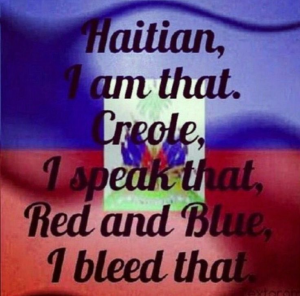by Robine Jean-Pierre
Have you ever heard someone refer to Haitian Creole as “broken French” or “French slang”? This can be offensive to speakers of the language, mainly because it is inaccurate.
Haitian Creole (or kréyol ayisyen) is the main language spoken in Haiti. When we Haitians refer to the language we just call it kréyol, but recognized internationally, adding “Haitian” distinguishes it from the many other types of creoles there are worldwide. Several other Caribbean and/or West Indian nations have creoles, and even Australia does as well.
So what is a creole? A creole starts off as a pidgin, a rudimentary “language” of sorts that combines elements from the languages of two different countries. It is a makeshift language used mainly for business; that is why many pidgins and creoles have been a direct offspring of imperialism. The vocabulary often comes from the language of the dominant nation while the grammar comes from the language of the subordinate nation (see Maria Khodorkovsky’s article, “Pidgins and Creoles: The Formation of Nonstandard Language”). A pidgin becomes a creole when it is passed down to the next generation of speakers as their primary language.
Haitian Creole is a mix of French, West African dialects spoken by the slaves whom were brought over to Haiti (formerly Hispaniola), and even some minimal indigenous languages such as Taino. (include chart) From this point on, when I refer to Creole I mean Haitian Creole. Growing up hearing it in my home, I find it to be an amusing and colorful language. Sometimes, I feel as if Creole words and phrases capture an idea or emotion better than English does.
To anyone who would wish to learn it, one of the advantages is that one word can be used to mean several things, so you would not have to learn too much vocabulary to express several ideas. For example, whereas in English we have five first person singular pronouns (I, me, my, mine, myself), in Creole these are all expressed with the same word: mwen (aside from myself, which would be tet mwen). In a similar manner, verbs do not have to be conjugated in Creole the way they often are in other languages. In English, the verb “to eat” changes depending on who is the subject (either adding or dropping an ‘s’) but in Creole it is always the same: mwen manje, ou manje, li manje, etc.
On the flip side, I would say that the hardest part is the pronunciation. There are many sounds in Creole that are akin to French and West African dialects, so if you speak any of these languages you would have an advantage. Certain consonant sounds are brought together in ways you would not hear so much in English. For example, consider the word dlo (water) which derives from the French de l’eau (some water, or of water). It might be hard for an American English speaker to say this because no English words, from what I know, ever start with that dl- combination. You might find it in the middle of a word, like medley. But even then, most of us would say the word like “med-lee,” not “meh-dlee.” A lot of beginners (including myself when I was younger) pronounce dlo like the English “glow” for this reason; gl- is more natural to the tongue.
The ‘r’ in Creole is also tricky. For untrained ears it is sometimes just barely audible, like in the word drapo (from drapeau meaning flag). This ‘r’ is pronounced more in the back of your throat, unlike a “Spanish r,” for instance, which is more toward the front of your mouth, using the tip of your tongue. In other Creole words, the ‘r’ more closely resembles an English ‘w,’ especially at the beginning of the word. The word roch (rock, stone) would sound most like “wush” (rhyming with brush).
I hope this article helped you to learn more about Haitian Creole, and made it clear to you that it is indeed a formal language. I encourage you to do your own research, indulge in Haitian culture (especially the food) and learn a few words. You never know when it might come in handy. Mesi anpil! (Thank you very much!)
Sites to consider:
- Pidgins and Creoles: The Formation of Nonstandard Language https://www.altalang.com/beyond-words/2012/11/01/pidgins-and-creoles-the-formation-of-nonstandard-language/
- History of Haiti http://www.nationsonline.org/oneworld/History/Haiti-history.htm
- CREOLE: THE NATIONAL LANGUAGE OF HAITI http://www.indiana.edu/~creole/creolenatllangofhaiti.html
- The History of Haitian Creole – A Closer Look http://www.howtocreole.com/2014/04/the-history-of-haitian-creole-closer.html





Pingback: I’ve Got the Keys | The Buzz